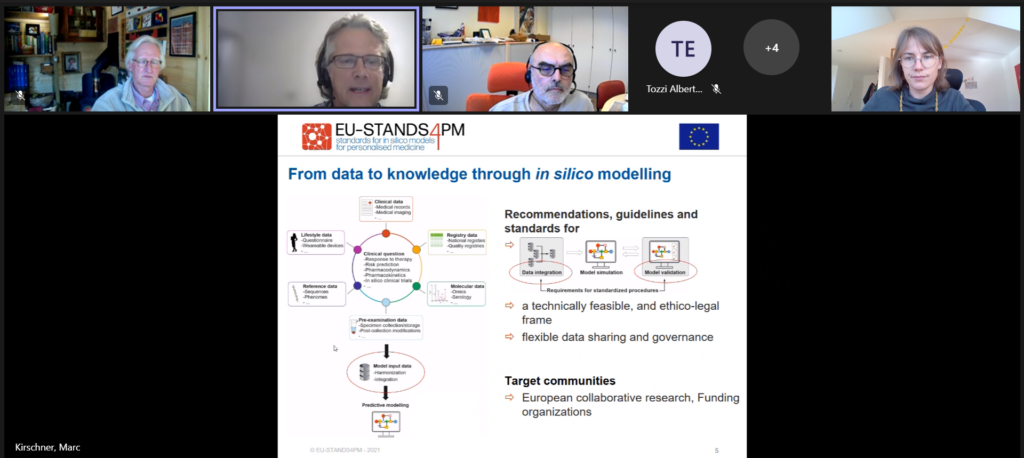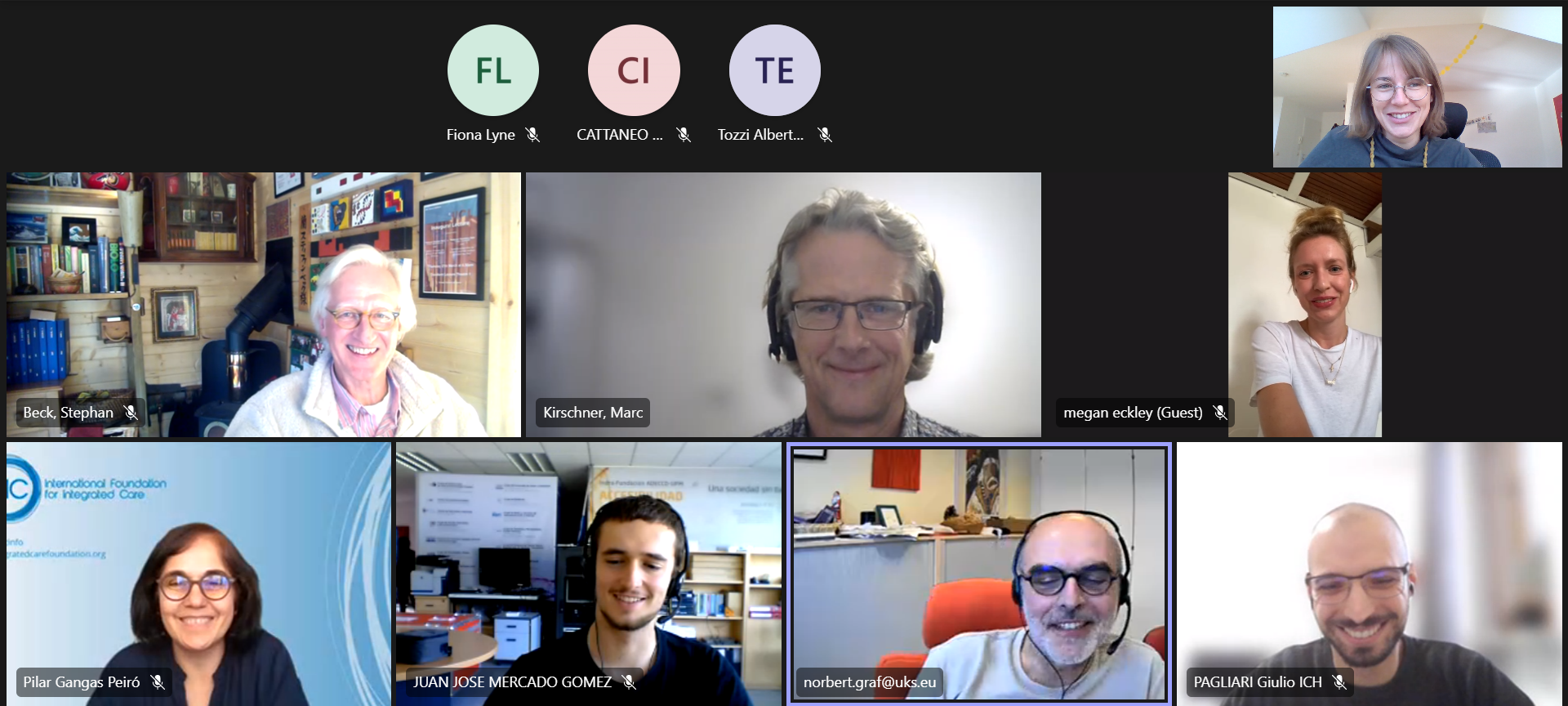We are launching our Fieldwork Survey!
EU4CHILD intends to lay the foundations for the development of a multi-purpose ecosystem for a Paediatric Cancer Data inventory, seeking to understand the main challenges behind digitalization and data sharing through the development of a potential set of AI-based services for the detection, diagnosis, prognosis and treatment of several types of childhood cancers. A huge part of this effort is driven by our fieldwork strategy, which includes personal interviews, focus groups and surveys as the main research tools to map out and address our stakeholder's needs.
As a first step in our fieldwork plan, we are glad to present EU4CHILD's Fieldwork Survey! This online survey has been created to assess and refine the requirements already identified in our initial analysis of EU policy, other EU funded projects and related literature on how to approach to creation of an AI-based ecosystem for childhood cancer.
Are you a survivor of pediatric cancer or a caregiver? Do you work in the healthcare sector? Are you an IT expert or a policy maker? Maybe you are just a normal citizen interested in the potential of AI in health?
If your answer to any of these questions is yes, we would be honored if you could participate in this survey and give us your opinion! As always, the process is completely anonymous and it will only take 10 minutes of your time. Thanks for your cooperation!
Click here to navigate directly to our Fieldwork survey
Photo by Phil Hearing on Unsplash
EU4CHILD's first steps towards an integrated AI ecosystem for pediatric cancer
As part of our ongoing work in EU4CHILD, we have been focused on laying the groundwork for what an Artificial Intelligence (AI) ecosystem for action on childhood cancer can look like. This is the driving force behind what would ultimately be EU4CHILD’s roadmap for the implementation of AI applications in pediatric cancer. During these first 6 months, we have been exploring the possibilities of this ecosystem under the needs, constraints and requirements coming from children and adolescents with cancer, young survivors, their families and caregivers, clinicians and medical professionals, IT professionals and data scientists and many more.
Without further ado, join us in this journey through the seemingly endless potential of AI in pediatric oncology and its most immediate challenges.
The clinical perspective: ethics first
The ethical implications of an ecosystem such as the one we are trying to create for EU4CHILD are many and very diverse. First and foremost is to consider that this ecosystem will be designed for pediatric cancer patients –a vulnerable demographic due to their young age–, while not losing sight of the ramifications regarding responsibility, transparency and agency that appear when bringing Artificial Intelligence into the clinical decision-making in childhood cancer, which are far-reaching.
Explainability lies at the core of these requirements: young cancer patients, survivors and their caregivers deserve to be informed and adequately involved in their own care. Information about treatment and follow-up options should be constant, clear and concise. The caveat: these basic directives clash with the black-box nature of many AI methods. Even when the input data is well known, the logic that prompts an AI algorithm to reach a certain outcome may be totally obfuscated for healthcare professionals and patients, making the whole process hardly auditable. To bring some light into this black-box, decision-support systems should provide a human recognizable sequence of arguments, one which lets the AI system come to the final decision on diagnosis or treatment options.
What would make a model explainable for clinicians then? This simple question ties in nicely with the topic of accountability. From a clinical standpoint, explainability has traditionally been viewed as a means of ultimately justifying decision-making in a given situation. In other words, more so than knowing what results a hypothetical AI model yields, we are fundamentally concerned with how those results came to be.
The problem with data sharing
Even though the intersection of AI and healthcare is still fraught with many ethical and legal challenges, only one of them specifically targets the foundation of all AI systems: data sharing. Building and validating AI applications for a field such as pediatric oncology takes the issue of data sharing –already a widely-recognized hurdle for research as a whole– to new levels of complexity. In the realm of AI, data is critical to train and fine-tune algorithms. Without quality data, we can only arrive at subpar AI models and inevitably, poor outcomes.
These limitations are only magnified when dealing with data on pediatric cancer, a rare disease by definition: apart from data scarcity and fragmentation (both inherent to rare diseases), we must also ponder the dilemma of data privacy and protection. The GDPR allows for the sharing of anonymized data, provided there is legitimate interest for its use. However, can we confidently speak of achieving full anonymity in the realm of childhood cancer when the potential for reidentification of a given patient from their collected data exists?
The answer is “barely”. This is where pseudonymization and informed consent come into play, and new ethical ramifications arise. The moment when a child is diagnosed with cancer is a very delicate situation in which their family and caregivers are expected to process a large volume of critical information under immense stress and uncertainty. Consequently, the process of informing them about diagnosis and treatment options, and requesting their consent to collect, process and share their child’s medical data for medical purposes must be handled with the utmost care.
The technical dimension
In order to successfully streamline the development and adoption of meaningful AI solutions in healthcare, we need to fill in the blanks of what it is exactly that we want to achieve (the application per se) and how it can be accomplished in a privacy-preserving manner. Finding the right approach and model for a given task (among all available AI techniques) is a not a straightforward process; it takes time and effort.
On this topic, Prediction Models as a Service seems to be a reasonable design choice to juggle requirements on data security while preserving flexibility. In this scenario, prediction models are offered as a service by a data processor, so the data controller maintains full control over both the data fed to the model and its preferred degree of pseudonymization. This allows the data controller to keep the link between pseudonym and patient data, which reduces the likelihood and severity of a potential data breach.
To expand on these privacy nuances, a distributed approach seems to be a no-brainer for the healthcare sector. Novel techniques like Federated Learning, Swarm Learning and Differential Privacy share this distributed approach. For some solutions, patient data does not have to leave the clinic and can thus be processed on site, which of course requires on-premise computation resources, but also serves to strengthen the data protection targets even more. At their core, all these approaches rely on the concept to collaboratively develop, share and refine AI models while keeping patient data secure.
Data is the way forward
Fueled by the shared realization of the enormous potential medical data can hold, the collective spotlight is now fixed on how to unlock this ‘dormant’ value in health-related data. This ambition is not trivial, however: the healthcare sector (at the EU and global stage) is rich in data but poor in information, and there is a distinct lack of evidence-based information to inform research, policy decisions and regulations.
There is also the current siloed approach to health data collection and management to contend with, and the overall disparity of data sources severely limits the value that can be extracted from it. Hospitals may store data on the same clinical pathologies in widely different formats, choosing to inform specific data fields and disregard others, ultimately making it so that even when data is accessible, it is difficult for end users to discover and understand its underlying structure and meaning.
Into this already chaotic mix goes yet another ingredient: data quality. Available data within a clinical setting may be either incomplete or not stored routinely, thus hampering its sharing and reuse potential and highlighting the pressing need for broadly applicable standards capable of interpreting it. And it is here precisely that the next frontier in healthcare awaits: in how to unravel the heterogeneity of health data through computer-based modelling (i.e. in silico models) to pave the way towards personalized medicine.
This is particularly true in pediatric oncology, where it looks as if there might be a threshold for cure in many cancer types, and despite high survival rates, further advances are hard to realize by means of just clinical trial operation. It has become essential to merge research results from biomolecular findings, imaging studies and scientific literature with clinical data from patients to expand the capability to generate, analyze and share progressively larger datasets. Just a modest increase in the molecular data collected from individual patients could grant invaluable insights into the degree of variability of pediatric cancer and will help us push the boundaries on how to care for not only young cancer patients, but all those suffering from a rare disease.
When we shift our focus to the individual, all diseases become unique.
This article was created by Christian Brossette and Diana López from the EU4CHILD consortium
Photo by Kelly Sikkema on Unsplash
EU4CHILD welcomes EU-STANDS4PM for a joint workshop
Last week we welcomed our colleagues from EU-STANDS4PM for a workshop on new models for data sharing and governance in personalized medicine. It was the perfect opportunity to learn more about their work, vision and goals.
Thanks to this joint session, we started putting together the pieces of our Artificial Intelligence ecosystem for childhood cancer, through a combination of ethical research, privacy-by-design and data-driven innovation. Thanks to Stephan Beck from UCL Cancer Institute and Marc Kirschner from Forschungszentrum Jülich for their insights!
Curious about EU-STANDS4PM? Learn more about their work here!

New release! D2.1 - User and Ecosystem Requirements and Methodology is now available at Zenodo
Our second public deliverable has been uploaded to Zenodo!
Click here to see the outline of EU4CHILD's User and Ecosystem Requirements and Methodology. Inside, you will find:
- A compilation of user and ecosystem requirements identified from related research projects and literature mining.
- The overview and main findings from our stakeholder survey.
- Ethical and medical considerations for the ecosystem and its key legal requirements from the framework towards a future implementation plan.
- A list of technical and Artificial Intelligence considerations for a state-of-the-art ecosystem foundation.
- High level insights that reflect the current political, social and economic paradigm.
Photo by Ashkan Forouzani on Unsplash
New release! D4.1 – EU4CHILD Impact Master Plan is now available at Zenodo
Our Impact Master Plan is already up at Zenodo and publicly accessible!
Check it out here to learn more about our vision for EU4CHILD's overall project dissemination, communication and exploitation strategies and our contribution to standardisation and open-source initiatives. The plan also contains a compilation of elements designed and released to execute the dissemination and communication plans, including the project website, logo, presentation and documentation templates, social media channels and initial PR design.
Photo by Paul Hanaoka on Unsplash
We need your help! Check out our Questionnaire on Data Protection in Childhood Cancer
We are designing a new framework for research on Artificial Intelligence (AI), active collaboration and knowledge exchange on childhood cancer.
As a first step in this journey, we are researching the requirements and necessities for an online ecosystem that will support medical professionals in the diagnosis and treatment of children with cancer. This ecosystem will be able to provide diagnostic support and treatment recommendations with the help of AI. For patients and their families, the ecosystem is intended to provide better understanding of the disease and treatment.
We would like to get your opinion on this topic and so, we have developed a questionnaire that is available online in 5 languages (English, German, Spanish, French and Italian). It will only take you a few minutes to complete and it will help us immensely: click here to navigate to our questionnaire and let your voice be heard!
Photo by Annie Spratt on Unsplash
EU4CHILD's first official slide deck is out!
Curious about our project? We are proud to present EU4CHILD's first slide deck: a brief presentation on our vision for a EU ecosystem on Childhood Cancer, our tools and services and most importantly, our motivation to connect patients, carers, clinicians and technical experts to provide improved diagnosis, personalised treatment and care through the power of Artificial Intelligence.
Check it out here!
Photo by Steve Johnson on Unsplash
Our public community at Zenodo has just launched!
Here at EU4CHILD we all share the vision of the European Open Science Cloud and Open Access research initiatives. Thus, we are committed to making our results easily accessible to other fellow researchers and the wider community, and will provide open access to peer-reviewed publications and scientific data generated within our project.
That’s why we have set up a dedicated community and repository at Zenodo, where we will be uploading publications, public deliverables, data, press releases and much more as the project goes on.
Check it out here!
EU4CHILD kicks off its fight against Childhood Cancer
It's official! On May 7th, all EU4CHILD partners gathered virtually to discuss and set the stage for what is to come: our vision for a European ecosystem of Artificial Intelligence services for pediatric cancer that pushes the boundaries on current research and leaves nobody behind.
EU4CHILD is a PPPA-AG (Pilot Project & Preparation Action Grant) to connect key European stakeholders in childhood cancer care by means of eXplainable AI. During this next year and half, we are committed to build an engaged community of patients and families, healthcare professionals, AI experts and policy makers to advance diagnosis, treatment and quality of life in childhood cancer.
Read our press release to learn more!









